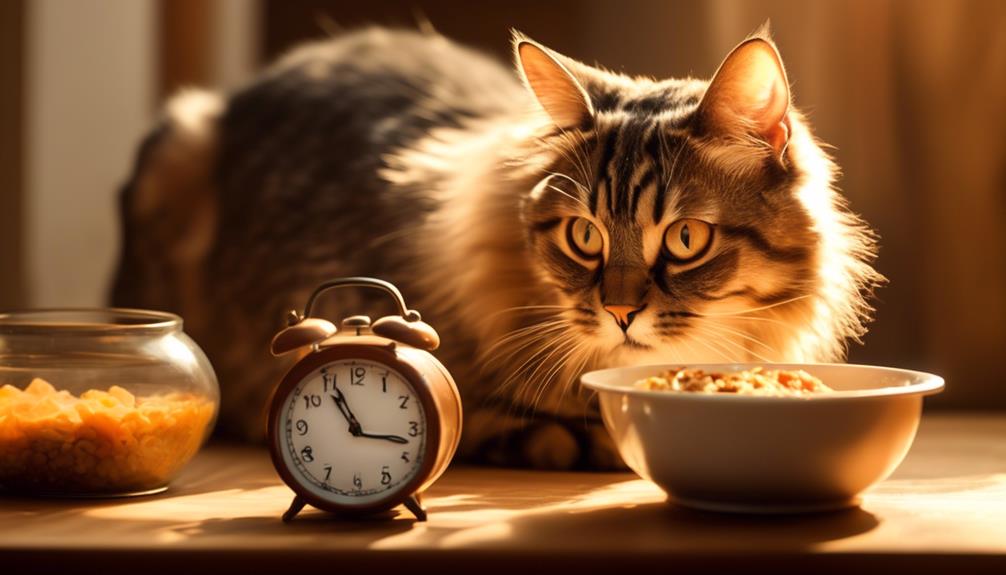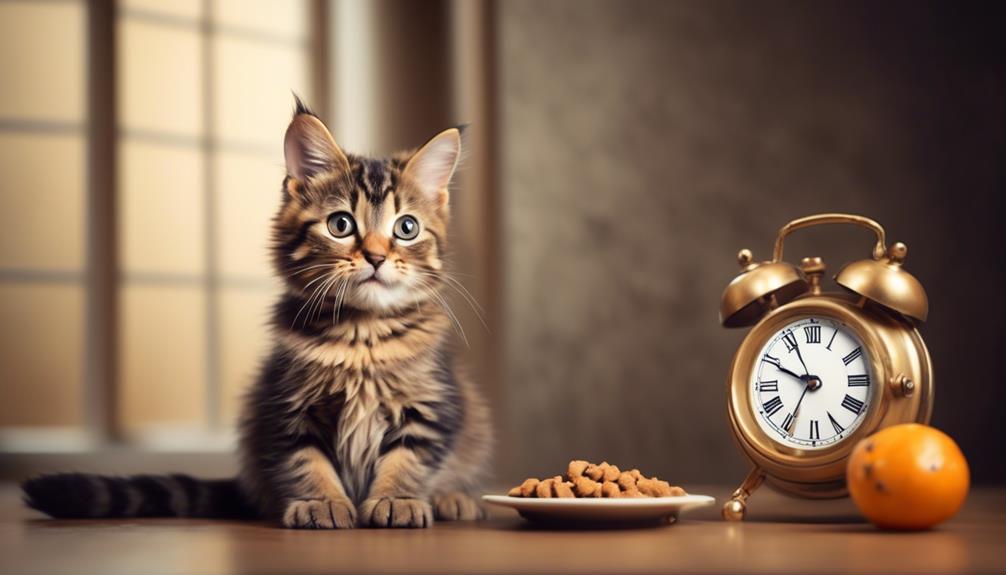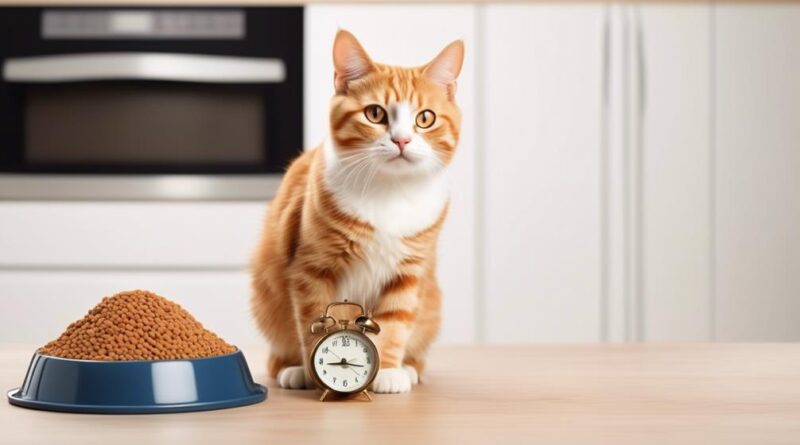Why Is Timing Key for Your Cat's Nutrition?
You've likely heard the saying, 'timing is everything.' When it comes to your cat's nutrition, this old adage holds true. But have you ever stopped to consider why timing is so crucial when it comes to feeding your feline friend?
The answer may surprise you, and it could have a significant impact on your cat's overall health and well-being. So, before you dismiss the importance of timing in your cat's nutrition, consider the following insight that could make all the difference in your pet's life.
Breakfast

When feeding your cat breakfast, ensure that the meal is balanced and meets their nutritional needs. A consistent morning routine is essential for your feline friend, so establishing a feeding schedule can be beneficial. Cats are creatures of habit, and having a set time for breakfast helps regulate their metabolism and energy levels throughout the day.
Incorporating breakfast into your cat's feeding schedule aligns with their natural hunting instincts. In the wild, cats would typically hunt for food in the early hours of the morning. By providing a balanced breakfast, you're simulating this natural behavior and supporting their overall well-being. It's important to offer a meal that includes protein, healthy fats, vitamins, and minerals to keep your cat satisfied and energetic.
Your morning routine should include setting aside a specific time for feeding your cat breakfast. This consistent schedule helps prevent overeating or undereating, leading to a healthier weight and digestive system for your feline companion. Additionally, it allows you to monitor your cat's appetite and detect any changes that may indicate potential health issues.
Lunch
Establishing a consistent feeding schedule for your cat not only supports their natural hunting instincts at breakfast but also sets the stage for a balanced and satisfying lunch. Meal timing plays a crucial role in meeting your feline friend's dietary needs. When it comes to lunch, it's important to offer a midday meal that aligns with your cat's natural behavior and nutritional requirements.
Ideally, lunchtime for your cat should occur around midday, providing a substantial break between breakfast and dinner. This timing mimics the natural feeding patterns of wild felines, who often hunt and consume their prey during the day. By offering a balanced lunch at this time, you can help regulate your cat's energy levels and prevent overeating during the evening hours.
Feline dietary needs dictate that lunch should consist of high-quality protein, as cats are obligate carnivores and require meat for essential nutrients. A portion of lean meat, such as chicken or turkey, can be served alongside a small amount of vegetables or grains to provide additional fiber and essential vitamins. However, it's important to monitor portion sizes to avoid overfeeding, as obesity can lead to various health issues in cats.
Dinner
Would your cat benefit from a satisfying and balanced dinner that supports their natural hunting instincts and dietary needs? Absolutely! Just like humans, cats thrive on routine and consistency when it comes to meal frequency. Offering your feline friend a nutritious dinner is crucial in maintaining their overall health and well-being.
Meal frequency plays a vital role in a cat's daily routine. Providing a well-balanced dinner ensures that your cat receives the necessary nutrients to support their energy levels and overall health. Cats are natural hunters, and their bodies are designed to consume multiple small meals throughout the day. Dinner time offers the perfect opportunity to fulfill this instinctual need by providing a satisfying and nutrient-rich meal.
When preparing your cat's dinner, it's essential to consider nutrient balance. A well-rounded dinner should include a mix of high-quality protein, healthy fats, vitamins, and minerals. This balance supports your cat's muscle development, immune system, and overall vitality. By offering a nutrient-dense dinner, you're not only satisfying your cat's hunger but also contributing to their long-term health.
Incorporating a consistent dinner routine with a focus on nutrient balance can significantly impact your cat's overall well-being. By providing a satisfying and balanced dinner, you're not only meeting your cat's natural instincts but also supporting their nutritional needs for a healthy and happy life.
Portion Control
Maintaining proper portion control for your cat's meals is essential for their overall health and well-being. Weight management is a critical aspect of portion control. By ensuring that your cat consumes the right amount of food, you can help prevent obesity and its associated health issues. Overfeeding can lead to weight gain, which may strain your cat's joints and organs, impacting their overall well-being. On the other hand, underfeeding can result in malnutrition and weakness.
Portion control also plays a vital role in maintaining your cat's digestive health. Feeding your cat appropriate portion sizes can help prevent digestive issues such as vomiting, diarrhea, and constipation. It's important to pay attention to hunger cues and grazing behavior. Cats are natural grazers, and providing controlled portions can help regulate their eating habits. By feeding them at set times and in controlled amounts, you can prevent overeating and promote healthy digestion.
Understanding your cat's individual needs and monitoring their body condition can guide you in determining the right portion sizes. If your cat is gaining or losing weight unexpectedly, adjusting their portion sizes can help manage their weight effectively. Always consult with your veterinarian to determine the appropriate portion sizes based on your cat's age, size, and activity level.
Snack Time
To promote healthy eating habits, offer your cat nutritious snacks in between meals. Snack time can be an essential part of your cat's diet, providing not only additional nutrients but also mental stimulation and the opportunity to strengthen the bond between you and your feline friend.
When choosing snacks for your cat, it's crucial to consider any potential food allergies. Just like humans, cats can develop allergies to certain foods. Common culprits include beef, dairy, fish, and wheat. To prevent adverse reactions, carefully read the ingredients of any snacks you plan to offer your cat, and introduce new snacks gradually to monitor for any signs of sensitivity.
Moreover, snack time can also play a role in your cat's dental health. Certain snacks, like dental treats or chews, are specifically designed to promote oral hygiene. They can help reduce plaque and tartar buildup, freshen breath, and massage the gums. However, it's important to select dental snacks that are appropriately sized for your cat to prevent choking hazards. Additionally, always supervise your cat while they're enjoying dental treats.
Water Intake
Encourage your cat to drink an adequate amount of water daily to support overall health and well-being. Monitoring your cat's hydration habits is crucial as it directly impacts their well-being. Cats can be finicky about their drinking behavior, so it's essential to create an environment that encourages them to consume enough water.
Understanding your cat's hydration habits is vital in ensuring they stay healthy. Cats are obligate carnivores, and their natural prey consists of a high moisture content, contributing to their low thirst drive. As a result, domestic cats mightn't feel the urge to drink water as frequently as they should. It's important to observe your cat's drinking behavior and ensure they've easy access to clean, fresh water at all times. Consider placing multiple water bowls around your home, especially if you have multiple cats or a multi-level household.
Promoting healthy drinking behavior can involve incorporating wet food into your cat's diet, as it provides additional moisture. You can also consider using cat water fountains, as some cats are attracted to running water. Additionally, spending interactive time with your cat near their water source can encourage them to drink more.
Treats

As your cat's nutrition is essential, consider incorporating treats into their diet with moderation and purpose to complement their overall well-being. Treats can be an effective tool for training and can also serve as a healthy indulgence for your feline companion. When choosing treats for your cat, opt for options that aren't only tasty but also provide some nutritional value.
When it comes to treats, there are a few key considerations to keep in mind:
- Training treats
- Utilize small, flavorful treats as a positive reinforcement during training sessions. Look for treats that are specifically designed for training purposes, as they're often small in size and low in calories, allowing you to reward your cat frequently without overfeeding them.
- Incorporate treats into your training routine to reinforce good behavior and encourage learning. Whether you're teaching your cat to perform tricks or to use a scratching post instead of furniture, using treats strategically can make the training process more effective and enjoyable for your feline friend.
- Healthy indulgence
- While treats should only account for a small portion of your cat's daily caloric intake, they can still be a source of enjoyment and enrichment. Look for treats that offer health benefits, such as dental treats that promote oral hygiene or treats enriched with vitamins and minerals to support overall wellness.
- Consider incorporating interactive treat-dispensing toys into your cat's routine to provide mental stimulation and encourage physical activity while enjoying a tasty reward.
Feeding Frequency
Consider adjusting your cat's feeding frequency based on their age, activity level, and overall health. When it comes to feeding frequency, you have two main options: free feeding and scheduled feeding.
Free feeding involves leaving food out for your cat to eat at their leisure, while scheduled feeding involves providing specific meals at set times. The choice between these methods can affect your cat's nutrition, weight management, and overall well-being.
Free feeding may be suitable for some cats, especially those who are more self-regulated in their food intake. However, it can lead to overeating and obesity in others. Scheduled feeding allows you to monitor your cat's food intake more closely, making it easier to control portion sizes and ensure they're getting the right amount of nutrients.
Another aspect to consider is fasting. Fasting, when done correctly and under veterinary guidance, can have potential health benefits for your cat. It can aid in weight management, improve digestion, and even help regulate blood sugar levels. However, fasting may not be suitable for all cats, especially those with certain health conditions or specific dietary requirements.
Frequently Asked Questions
Can the Timing of My Cat's Meals Affect Their Behavior and Mood?
The timing of your cat's meals can definitely affect their behavior and mood. Mealtime rituals and food puzzles can help keep your cat mentally and physically stimulated.
By feeding them at consistent times, you can establish a routine that can help regulate their mood and behavior.
Additionally, using food puzzles can provide mental enrichment and prevent boredom, which can also impact your cat's overall demeanor and well-being.
How Should I Adjust My Cat's Feeding Schedule if They Are on a Prescription Diet or Have Special Dietary Needs?
If your cat is on a prescription diet or has special dietary needs, it's important to adjust their feeding schedule accordingly.
Consult with your veterinarian to determine the best feeding times and portion sizes for your cat's specific dietary requirements.
Keep a consistent schedule to ensure your cat gets the nutrition they need and to help manage any health conditions.
Stick to the prescribed feeding plan to support your cat's overall well-being.
Are There Specific Health Conditions That May Require a More Rigid Feeding Schedule for My Cat?
For specific health conditions, like diabetes or obesity, your cat may need a more rigid feeding schedule. Consistency in feeding frequency is crucial for managing these conditions and maintaining their weight.
What Are the Potential Consequences of Inconsistent Feeding Times for My Cat's Overall Health and Well-Being?
Inconsistent feeding times for your cat can lead to consequences for their overall health and well-being. Cats thrive on routine, so irregular feeding times can disrupt their natural behavior and mood. It may cause anxiety, irritability, or even obesity due to overeating.
Establishing a consistent feeding schedule is crucial to maintaining your cat's health and ensuring they receive the proper nutrition at the right times.
How Can I Determine the Best Feeding Schedule for My Cat Based on Their Age, Activity Level, and Individual Preferences?
To determine the best feeding schedule for your cat based on their age, activity level, and individual preferences, start by observing when they seem most hungry and energetic. Adjust the feeding frequency accordingly, keeping in mind that kittens and active cats may need more frequent meals.
Monitoring their weight and energy levels can help you fine-tune the schedule to ensure they're getting the nutrition they need.
Conclusion
So, make sure to pay attention to the timing of your cat's meals and snacks. By providing breakfast, lunch, and dinner at consistent times, controlling portion sizes, and monitoring their water intake and treats, you can help keep your cat healthy and satisfied.
And don't forget to schedule in some snack time too! Your cat will thank you for it.
